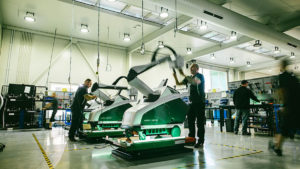Money Talks: Here are 3 biotechs chasing the dream

Money Talks is Stockhead’s regular drill down into the sectors and companies that investors have their eye on right now.
Today, we hear from Lincoln Liu, a director at Rawson Lewis.
Australia’s biotech sector is home to a handful of large caps — including the ASX’s largest company CSL (ASX:CSL) — and several dozen small caps, many of which are at the clinical trial stage.
The ultimate goal is commercialisation. For many companies, selling early or partnering up with a large cap may seem an easier way to achieve this.
But Liu reckons ‘going it alone’ is not an impossible dream for small cap biotechs.
“I’d say there is a lot of money out there, and e a number of funds and specialist VCs that’ve done quite well over the last 5-7 years which means there is forward capital that can support [companies] to commercialise,” he told Stockhead.
Liu also noted a handful of these companies are unique in targeting diseases for which no treatment exists or have had no new treatments for several years.
RECCE PHARMACEUTICALS (ASX:RCE)
Market Cap: ~$194m
Recce (ASX:RCE) share price chart
Recce has really taken off in recent months after two of its compounds were selected to be part of COVID-19 tests run by the CSIRO and the Doherty Institute.
But its traditional fight is against superbugs, which is bacteria strong enough to resist conventional antibiotics. One such example is sepsis or blood poisoning.
Liu is watching both battles, against sepsis and COVID-19, closely.
“If you look at the interest which has gone into Recce in the last 12 months, it’s certainly been in their lead product for sepsis – which is RECCE 327. They are looking to human clinical trials this year,” he said.
“What they’re focusing on is novel methods of action in a market which, in terms of sepsis, there hasn’t been new treatments in over 30 years.”
MEDLAB CLINICAL (ASX:MDC)
Market Cap: ~$41m
Medlab Clinical (ASX:MDC) share price chart
Medlab does not think of itself as a “pot stock” despite the most famous drug in its portfolio – NanaBis — being cannabis based.
The company is currently putting it to the test against cancer pain.
While the cannabis sector in Australia has been slow to mature, Liu notes the company is ahead of its peers. It one of the few with clinical evidence to support its product.
“I think it is exciting despite the weakness of sentiment in some of the global peers,” he told Stockhead.
“Its come a long way with its cannabis technology and should start to become recognised by global partners.”
ANTISENSE THERAPEUTICS (ASX:ANP)
Market Cap: ~$41m
Antisense (ASX:ANP) share price chart
Antisense is fighting Duchenne muscular dystrophy (DMD), a genetic disease occurring predominantly in young males that causes muscle weakness.
In May, the company announced positive Phase II clinical trial results and last week submitted its application to the FDA for Orphan Drug status in the US.
It told shareholders if granted, this will mean incentives to help accelerate its development. These may include credits towards the cost of clinical trials and a waiver of US prescription drug filing fees.
Liu likes the company not only because it has a clear pathway but the devastation caused by DMD.
“This company has a very defined regulatory pathway – accelerated because there’s very little being done in this space,” he said.
Lincoln Liu is a Director at Rawson Lewis, an independent Corporate Advisory and Equity Capital Markets firm with offices in Sydney and Melbourne.
The views, information, or opinions expressed in the interviews in this article are solely those of the interviewee and do not represent the views of Stockhead.
Stockhead does not provide, endorse or otherwise assume responsibility for any financial product advice contained in this article.

UNLOCK INSIGHTS
Discover the untold stories of emerging ASX stocks.
Daily news and expert analysis, it's free to subscribe.
By proceeding, you confirm you understand that we handle personal information in accordance with our Privacy Policy.








